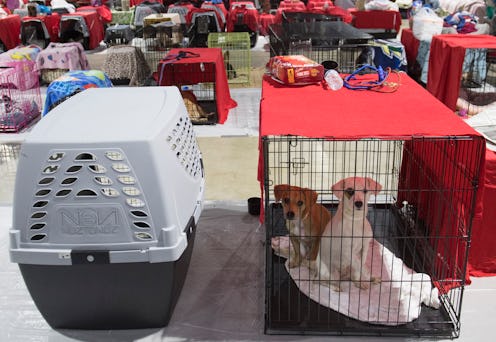
With Hurricane Irma's wrath directed at the entire state of Florida, as well as several other southeastern states, animal rescue organizations and pet shelters are overwhelmed. If you're a friend to the four-legged, you might be wondering how to help animal shelters during Hurricane Irma. More than 600,000 animals died during and after Hurricane Katrina in 2005, according to The Atlantic. As a result, awareness about vulnerable animals during disasters is rising, and the Pets Evacuation and Transportation Standards Act was a direct result of the tragic aftermath of Katrina.
The act requires that disaster response plans “account for the needs of individuals with household pets and service animals before, during and following a major disaster or emergency.” However, pets are still being abandoned ahead of Irma, which has been predicted to be one of the most catastrophic storms to ever make landfall in the U.S. The Palm Beach Post reported that some people fleeing the storm left their pets tied to trees, which not only cruel, but it's also is illegal.
Dianne Sauve, head of Palm Beach County Animal Care and Control, told the Post that the department will be pursuing criminal charges against owners who abandoned their dogs and left them tied up in places where they would not be able to escape the storm. 26 dogs were rescued from Bell Glade, Fla. Sept. 8 after being abandoned by their owners ahead of Irma. With animal shelters already overwhelmed, here's how you can help ease the burden.
Consider Becoming A Temporary Foster
If you want to help, even small efforts can make a big difference. One thing you can do is foster an animal from your local animal shelter to make room for animals being transported from disaster areas to the rest of the country.
"Taking in a pet is a significant decision. It’s life-changing," Ian Livingston wrote for the Washington Post. "But if you think it’s the right thing to do, now is a good time to contact local shelters. The effort from Hurricane Harvey is still underway, and new pets are already on the move in areas threatened by Hurricane Irma."
If you're not able to foster or adopt right now, spread the word on social media, and among your friends and family. "Even if someone can’t adopt, telling friends that might be able to adopt is extremely helpful,” Human Rescue Alliance Communications Director Matt Williams told the Post via email.
Make Directed Donations
While it's always good to make donations to large animal rescue organizations, making small, directed donations to specific animal groups operating in disaster areas does the most good the fastest. Many local rescue groups are entirely volunteer and donation based, and are overwhelmed during regular days. During a disaster they need all the help they can get.
"With Irma looming, a great place to start is with your local animal welfare community," Kim Alboum, director of The Humane Society of the United States’ emergency placement partner network, told the Dodo.
Additionally, consider donating to networks you have a connection with. I directed a donation to a rescue in Puerto Rico that was taking in animals after Irma passed through the U.S. Territory earlier this week. The rescue, All Sato, saved my dog and her two puppies from a highway in Puerto Rico before I adopted her.
If you don't have a personal connection with a rescue group, you can do an internet search for animal rescue groups and animal shelters in Florida, Georgia, Alabama, and the Carolinas, or consider giving to Code 3 Associates, an animal search and rescue organization that came to the rescue of animals displaced by Hurricane Harvey. They are already headed to Atlanta so they'll be ready after Irma's beating to start helping right away, according to the Daily Camera.
Volunteer For A Rescue Or Shelter
If you're cash poor, and you can't foster, most animal rescues and shelters need other kinds of help. Call your local animal shelter and ask how you can volunteer. Volunteer duties can include everything from walking dogs, spending times with cats, collecting and organizing supplies like towels, blankets, leashes, etc., and even office or social media work.
Shelters and rescue groups all over the country are likely going to be overwhelmed as they make room for animals displaced by both hurricanes and fires, so now is a perfect time to help.
Help If You See An Animal In Distress
If you are in a disaster area, like the aftermath of Hurricane Irma, and you see an animal in distress, try to help. If you're not comfortable taking the animal to safety yourself, or if it's too dangerous, call police, a rescue group, or animal shelter, and wait until someone arrives. Many people assume someone else will help, and unfortunately, that's not always true.